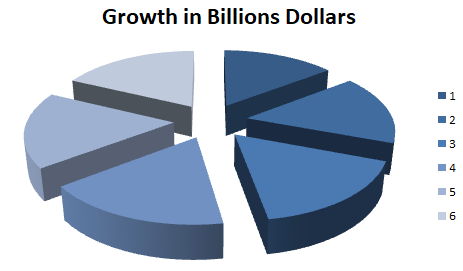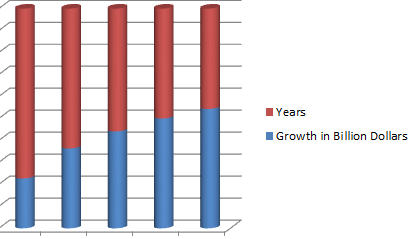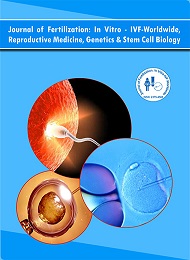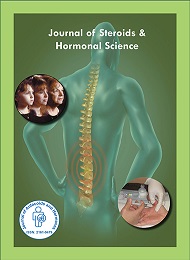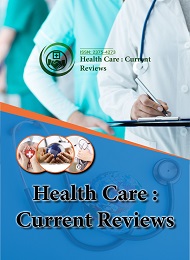Theme: Revolutionizing the Future Strategies for Women Health Research
PCOS CONGRESS 2023
The 6th Annual Congress on Polycystic Ovarian Syndrome and Fertility will be held in London, UK on December 07-08, 2023. It is a great pleasure to welcome all the researchers of their individual work on PCOS, scholars, and it is an extraordinary opportunity to go to this meet that investigates the information about the turmoil of PCOS and it is an exceptionally awesome benefit to have key speakers who will investigate their perspectives on PCOS and Fertility. This conference provides the book full of attention to the ladies about PCOS. It's a unique stage for analysts to comprehend that how it causes? What are the things to work out for the end of this issue?
PCOS Congress 2023 provides a major clean stage to the emerging advances, giving understudies a decent opportunity to have a propelled learning. This increases the flow of life for emerging and sprouting Specialists and Researchers. We do have an oral talk, poster presentations, e-poster introductions, workshops, Exhibitions and we welcome Gynecologists, Endocrinologists, Obstetrics, Embryologists, Endoscopic Surgeons, Infertility specialists, Gynecological Oncologists, Researches, Dermatologists, Professors, Doctors and Students from all over the world to have focused reasonable view about the PCOS, Fertility and Women Health.
PCOS Congress 2023 will be an excellent arena for debating novel discoveries and concepts. This event offers networking opportunities for Gynecologists, Obstetricians, Endocrinologists, Physicians, Nutritionists, Infertility Related Specialists, Researchers, Professors, Scientists, Doctors, Students and members of all Women Health and PCOS associations and universities. It also makes it easier to access possibilities for on-going education and top-notch content delivered by keynote speakers.
Abstract Submission Guidelines:
Ø Abstract length must not exceed 300 words.
Ø The title should be in sentence case.
Ø Mention the full name of the author and co-authors (if any) along with affiliation.
Ø It should contain short biography of the author (limited to 100 words) along with the photograph.
Ø All the abstracts will be reviewed by the scientific committee members and you will get an email within 24-48 hours after submission of your abstract.
Ø All the accepted abstracts will be published in the conference proceedings in the respective Journal.
Abstract Submission URL: https://pcos.healthconferences.org/abstract-submission.php
Speakers from all over the world can submit their abstracts, research papers, case studies, and posters by choosing a topic from the "Call for Abstract" or your area of research interest. For attendees, Doctors, Presenters, Physicians, Students, Academicians, Sponsors, Exhibitors and Groups, “PCOS Congress 2023” offers hotel packages and affordable registration and also provided Special registration for Webinar. Anyone can register for this conference using the choices available on the registration page.
Registration URL: https://pcos.healthconferences.org/registration.php
Why to attend?
- Provides a broad, comprehensive view of the Polycystic Ovarian Syndrome, as well as another approach to overcoming the unpaid debts caused by this disorder.
- To exchange perspectives and provide global data on the world's confusion
- It achieves the wide meet for key symposiums, workshops, and gives an edge work for understudies to have a sharp thought and gather great information.
- Endocrinologists, Obstetricians, and Gynecologists who work with patients suffering from Polycystic Ovarian Syndrome can receive credit for their efforts.
- People all over the world are switching to learn about polycystic ovarian syndrome, which includes poster presentations, symposiums with renowned speakers from recent works, and updates on PCOS, which serves as the framework for the meeting.
Target Audience:
- Obstetrics and Gynecologists
- Specialists in IVF
- IVF Centers
- Gynecological Pathologists
- Directors of Maternity Hospitals
- Endocrinologists
- Gynecological Oncologists
- Infertility specialists
- Heads of the Obstetrics & Gynecology Departments
- Embryologists
- Oncologists
- Pharmacotherapists
- Nursing scholars
- Endoscopic Surgeons
- Dermatologists
- Psychologists
- Students of Medicine Disciplines
- Upcoming Researchers
- Pharmacists
- Embryologists
- Neurologists
- Family Medicine Physicians and General practitioners
- Pharmacologists
- Anesthesiologist
- Health care systems and Hospitals
- Clinical Toxicologists
- IVF Associations and Societies
- Societies of Andrology and Gynecology
- Radiographers and Sonographer
- Obstetrics Community
- Health Care Professionals, Healthcare Administrator
Track 1: Polycystic Ovarian Syndrome
Polycystic Ovarian Syndrome is caused by a hormonal secretion imbalance. Elevated levels of endocrine internal production within the duct gland result in an excess release of endocrine into the bloodstream, resulting in the impact of the ovaries. As the name suggests, PCOS is caused by the formation of a variety of cysts within the ovary. Polycystic ovarian syndrome (PCOS) is a condition in which females have elevated levels of androgenic hormone (male hormone), which is characterised by irregular catamenial cycles, acne, significant periods, and excess body and facial hair.
PCOS is a condition characterised by internal abnormalities of the ovaries. 8-15% of women with procreative age square measure are significantly affected. Stein-Leventhal Syndrome is another name for it. Women in this condition have a higher risk of high blood pressure, cardiovascular disease, and female internal reproductive organ cancer, which is known as (Endometrial Cancer). The majority of PCOS women have multiple cysts on their ovary.
- Infertility
- Hirsutism
- PCOS-Genetics
- Menstrual disorders
- Metabolic Weight Loss
Track 2: PCOS and Fertility
Anovulation can be caused by Polycystic ovarian syndrome, which is caused by factors such as an excess production of androgens known as male hormones, insulin levels, and inflammation.
Anovulation is the inability to release an oocyte as a result of irregular menstrual cycles. This impediment caused by irregular menstruation can cause menopause to a woman under control and women suffering from PCOS. If this process of disruption in ovulation continues, it is difficult for women to become pregnant, which may lead to complications in getting pregnant and most of the hormones become unbalanced, making it difficult to carry a baby.
- Anovulation
- Effect of age
- Effects of contraception
- Contraception
- Previous pregnancies
- Hormone imbalance associated with polycystic ovaries
Track 3: Endometrial Cancer
Endometrial cancer is a type of cancer that begins in the ovaries, which are the size of an almond and are involved in egg production. Endometrial cancer develops from the endometrial layer (the uterine/womb lining). This is caused by abnormal cell growth, which has the ability to spread and invade normal cells and the functioning of other systems. It is also known as uterine cancer at times. Endometrioid carcinomas is the name given to this type of cancer. The main symptom of this cancer is vaginal bleeding that is not related to the menstrual cycle, and endometrial cancer usually develops after menopause. We can also speculate that the cancer is caused by an overexposure of the uterine walls to oestrogen levels. When it comes to the cause of this cancer, 2-5 percent of cases are linked to genes inherited from parents. Prolonged menstrual cycles of more than 35 days may progress to a severe condition that leads to endometriosis.
- The genetics of Endometrial cancer
- Endometrial Cancer subtypes
- Histopathology
- Metastasis
Track 4: PCOS-Women Health
Women suffering from polycystic ovarian syndrome have side effects such as diabetes, obesity, obstructive sleep apnea (OSA), heart disease, mood disorders, and endometrial cancer. The major function in blood varies is that insulin resistance develops, resulting in an increase in blood glucose levels in the body. This can be determined by conducting insulin level blood tests. Excess blood glucose results in the diagnosis of TYPE-2 diabetes in patients. PCOS is the most common hormonal disorder in women of childbearing age and can cause infertility issues, as well as cause weight loss or gain in women. Women who are more sensitive to insulin or who have insulin resistance due to a hormonal imbalance are more likely to be obese or overweight, putting the patient at a higher risk of heart disease, sleep apnea, and uterine cancer.
Obstructive sleep apnea is associated with metabolic disorders of the insulin that are caused by glucose intolerance in the bloodstream, the main symptom of OSA is restricted sleep entirely during the night times, the early stages of this OSA is snoring at night times and having irregular sleep, and this can cause effects of the quality of sleep towards the patient associated with PCOS. No two women with PCOS will experience the same symptoms. The condition of women with PCOS has several disorders that occur as a result of the polycystic ovarian syndrome. PCOS is associated with emotional and mental conditions such as anxiety, depression, difficulty concentrating, fatigue, mood swings, and chronic stress. Zinc is essential for building immunity in women suffering from PCOS, which causes infertility, as well as for improving fertility.
- Health in Pregnancy
- Maternal and Child Health
- Attention Deficit Hyperactivity Disorder
- Histopathology of ADHD
Track 5: In vitro Fertilization
In vitro fertilisation is a medical treatment or assisted reproductive technology used to help a woman conceive. Invitro fertilisation took a step toward monitoring and stimulating women's ovulatory processes by extracting sperm from the father and egg from the mother and allowing them to combine and fertilise to form an embryo. Once the embryo has been formed, it will be implanted into the mother's uterus. This implantation allows women to conceive more easily because the eggs have been fertilised by sperms outside of the normal biological process. It is also referred to as a type of assisted reproductive technology that is primarily used to treat infertility.
- Pregnancy intravaginal culture
- Embryo freezing & frozen embryo transfer (FET)
- Pre-implantation genetic diagnosis
- Testicular sperm extraction (TESE) & percutaneous epididymal sperm aspiration (PESA)
Track 6: Fertility Management & Treatment
High levels of male sex hormones (Androgens) and irregularity in the production of sugar levels in the bloodstream cause insulin resistance, which can have a negative impact on the menstrual cycle and prevent the release of an egg on a regular basis, or even stop completely or irregularly. This condition makes it more difficult for women with polycystic ovarian syndrome to have an easy pregnancy and makes it more difficult for those women to conceive, which can sometimes lead to miscarriage. Women who meet certain criteria may also experience reduced fertility or subfertility, necessitating additional medical attention. Sixty percent of PCOS women become pregnant without medical assistance.
- Monitoring ovulation
- Surgery for improving fertility
- Assisted reproductive technology
- Various medications
- Weight management
Track 7: Laparoscopy for Fertility
Laparoscopy is a sophisticated surgical procedure that involves inserting a fiber-optic instrument through the abdominal wall into the abdomen to provide a clear internal view of organs. Laparoscopy is one of the most advanced techniques used to treat or diagnose fertility complications or factors that cause fertility problems in patients suffering from infertility. Laparoscopy can be used on patients who have previously been diagnosed with infertility using ultrasound, ovarian reserve for females, and Semen Analysis for men. Laparoscopy is an in-depth examination of the uterus, ovaries, fallopian tubes, and pelvis of women experiencing fertility complications, with the goal of determining any abnormalities that may be affecting the women's fertility or ability to conceive. If a complication or abnormality is discovered during laparoscopy, additional instruments can be inserted through a tiny incision to aid in the diagnosis of infertility issues such as poor ovarian reserve or ovarian failure.
- Blocked fallopian tubes
- Uterine Abnormalities
- Pelvic Adhesions
- Abnormal Cervical Mucous
- Male Infertility Complications
Track 8: Fertilization Techniques
Fertilization is the process of combining male gamete and female gamete, which results in the formation of zygote in 10% of males suffering from infertility with Spermatogenesis disorder due to drastic changes in their lifestyle, surroundings, or environmental factors and Hormonal imbalances most of the couple, i.e., 17.2% of couples in 30% are not expected to have a child There are numerous reasons to consider what is causing infertility in either the male or female of that particular couple. Various modern inventive techniques for becoming fertile have been introduced. Because these methods are based on in vitro steps or procedures to improve sperm quality in order to overcome the natural barrier of fertilisation. Techniques include a variety of processes that each have their own specific indications.
- Gamete intrafallopian transfer (GIFT)
- Hormonal testing’s
- Microsurgical aspiration
- Zona pellucida drilling
- Genetic testing
- Intracytoplasmic injection of sperm (ICSI)
Track 9: Immunological Approaches to Fertility
Immune infertility has become a serious health issue, affecting one in every five women under normal circumstances; additionally, women with polycystic ovarian syndrome are becoming more common. Semen, also known as the composite fluid that contains sperm, cellular vesicles, and other cell components, may be a cause of sensitization of the female genital tract. Natural tolerance of the female reproductive tract caused by immune rejection of male sperm, which is a predisposing factor leading to a local or systemic response. Iso-immunization has also been linked to infertility. There are numerous specific components of the regenerative system that do not exist in other body systems, many of which are immunogenic efforts.
- Seminal fluid in female immune infertility
- Mucosal immunity of the female genital tract
- Ovulation Induction
- Hormonal Regulation
Track 10: PCOS- Associated Organs
Most women with Polycystic Ovarian Syndrome have a direct effect on nearby or interconnected major organs, which is usually caused by hyperinsulinemia; this hyperinsulinemia will negatively affect major organs. As the frequency of PCOS in women increases, it causes various disadvantages to the major functioning organs due to increased levels of Androgen Hormones in the body, influencing the higher risk factor to the patient and leading to the patient medical profiles with various diseases that cause side effects to the other organs in the system. Women with this condition may have severe feeding complications after giving birth due to low estrogen levels, which is the main factor that obstructs mammary tissue formation by producing less estrogen. Some of the major causes of Autism in a child born to a mother with Polycystic Ovarian Syndrome. Women who are predisposed to PCOS may have several neuronal defects that can lead to psychiatric disorders during the prenatal or postnatal period. These psychiatric impediments in PCOS women are frequently associated with menstrual cycle irregularities.
- Autoimmune disease
- Endo-neurological diseases
- Uro-gynecologic disorders
- Heart diseases
Track 11: Fertility and PCOS Medication
Fertility of women affected by the hormonal and endocrine-metabolic disorder known as polycystic ovarian syndrome is heterogeneous hormonal imbalance is the condition in which hirsutism, hyperandrogenism, and various other conditions primarily show an effect on the female reproductive system, resulting in infertile nature of women regenerative hormones. PCOS has no course and can be treated in its early stages, with symptoms such as hirsutism, acne, obesity, and others requiring specific treatment. Fertility is indigenously linked to subsequent lifestyle changes such as exercising and maintaining dietary subsidies and medication to alleviate the problem of infertility. Though achieving fertility in such PCOS-affected women is a little more difficult, there are some medications and treatments that show varying results.
- Fertility medications
- Birth control pills
- Progestin Therapy
- Home remedies
- Cyst aspiration
- Ovarian drilling
- Hysterectomy
Track 12: Fertility and Infertility –Women
Fertility can be defined as a woman's hormonal cycles that determine when she can achieve pregnancy; fertility is the ability of a woman to produce an offspring. Fertility declines in both men and women as they get older. Women generally lose fertility at a high rate between the ages of 45 and 50, as measured by fecundity (Potential for reproduction). Infertility is defined as a woman's inability to produce or conceive a child after 12 months or having difficulty carrying a pregnancy to term. There are no definite factors to evaluate the cause of infertility; it is dependent on hormonal imbalances; however, the main symptoms of infertility include inability to conceive, irregular menstrual cycles, hormonal complications such as hair growth, and sexual function. Among the causes of infertility are
- Age
- History of sexually transmitted infection
- Irregular periods
- Body weight and Exercise
- Tobacco and alcohol use
Track 13: Drugs in PCOS
Efficient drugs, which are mostly preferred in the case of patients suffering from Polycystic Ovarian Syndrome, are linked to a number of other organ disorders. PCOS necessitates first-line fertility treatment. Clomid (Clomiphene Citrate) and major drugs used in the case of blood glucose levels, diabetes, high blood pressure, and high blood sugars are the most commonly recommended by gynaecologists for fertility. Several other drugs are used to treat disorders caused by the polycystic ovarian syndrome that affect major organs.
- Anti-depressants
- Anti-Inflammatory drugs
- Anti-Diabetics
- Anti- Cancer Drugs
- Anti-Hypertensive
- Diuretics
Track 14: Bariatric Surgery in PCOS
The majority of patients who undergo bariatric surgery have obesity that was brought on by excess fat deposition. By using a gastric band to reduce the size of the stomach, this operation helps patients lose weight.
Women with polycystic ovarian syndrome experience decreased ovarian volume and elevated levels of biomarkers for androgen excess, among other consequences on their endocrine system. A specific study has evaluated the pre- and postoperative weight reduction, testosterone levels, BMI, ovarian volume, fasting glucose, and weight of 3 percent of the 15% of women with PCOS who underwent the bariatric procedure. Surgery results imply that a lady who has had bariatric surgery will have her PCOS's main symptoms resolved. The study's findings that symptoms lessened following bariatric surgery are therefore positive, but this kind of surgery is a severe cure and is only suitable for a select few. a brand-new way to lose weight involves taking a bariatric surgery pill that was made utilising bioengineering techniques.
- Oophorectomy
- Endometrial biopsy
- Laparoscopy & laser surgery
- Tubal ligation
Track 15: Obstetrics and Gynecology
The field of medicine known as obstetrics focuses on the study of pregnancy, childbirth, and the postpartum period. Based on the ensuing modifications in surgical techniques, it is integrated with the gynaecological division and is generally known as the surgical specialty of obstetrics and gynaecology. Obstetrics has a connection to gynaecological diseases like polycystic ovarian syndrome (PCOS), which affects pregnant women in a variety of ways. PCOS's effects are particularly severe in women who are trying to get pregnant. In addition to PCOS and other variables that might make it difficult for a woman to become pregnant, the main obstacle is excessive insulin production in the circulatory system, which causes a drop in metabolism and, as a result, pancreatic dysfunction. Preeclampsia and gestational diabetes can affect women with PCOS. This results in maternal death, which has two main causes: maternal haemorrhage and maternal sepsis. There is no distinction between symptoms and pregnancy complications or discomfort.
- Prenatal care
- Postnatal care
- Obstetric ultrasonography
- Obstetrical complication
- Placental abruption
- Placental praevia
- Placental accerta
Track 16: Postnatal Depression
Postpartum depression (PPD), often referred to as postnatal depression, is a type of mood illness that develops after childbirth and is frequently seen in women who have PCOS or who have recently given birth to a child. The cause or origin of PPD is unknown, but it is thought to be primarily caused by a number of characteristics, such as mood disorders, hormonal imbalances, and behavioural changes. PPD and similar subsequent disorders may also be caused by a direct attack on the brain, which can result in neuronal disorders. One in ten males who experienced a difficult or traumatic birth can develop postnatal Or postpartum depression, which is not just tied to the mothers.
- Postpartum Psychosis
- Peri-partum onset
- Postpartum Thyroiditis
Track 17: PCOS Advanced research
Effective research on PCOS indicates that the disorder is brought on by metabolic endocrinological dysfunction and improper hormone function. More research is being done to determine the precise cause of the disorder and a partial solution to support any subsequent PCOS-related actions that get worse. Recent studies have focused on a plant substance called resveratrol, which is produced through plant synthesis. The majority of plants, including those that grow raspberries, grapes, and peanuts, contain a type of phenol called phytoalenin, which is obtained from plant tissues in response to stress and invading fungi. Resveratrol also has anti-inflammatory properties, which it uses to lower the risk of coronary heart disease and to fight cancer effectively. Women with PCOS are administered a resveratrol medication into their systemic circulation, which may function effectively against hormonal abnormalities. After three months of treatment, the patient's blood can be drawn for analysis in order to determine the levels of testosterone and other androgen hormones that indicate the emergence or manifestation of the syndrome. This describes how the tool has changed. Including natural foods in your diet, such as almonds, milk, and vegetables, can assist to increase fertility and promote healthy hormonal function.
- Advanced works on PCOS and Mental Health
- Metformin and Lower Risk factors for Miscarriage
- Comparative studies of Allopathic and Homeopathic Medications
- Natural remedies to cure of Ovarian Cysts
- Advanced treatments to Improve Fertility
Scope & Significance :
The 6th Annual Congress on Polycystic Ovarian Syndrome and Fertility's goals are to raise awareness of PCOS throughout the world and educate attendees on cutting-edge methods for treating and diagnosing the condition.
The symposia and panel discussions offered by this conference will give a brief overview of PCOS and other major clinical disorders recognised in PCOS sufferers. Thus, we encourage the use of cutting-edge PCOS technical therapies and any new method or technique that keeps the disorder's symptoms in place.
This meeting's purpose is to provide in-depth information about the various strategies used in PCOS therapy. These techniques are essential for managing the psychological illnesses that cause confusion about pregnancy and labour in pregnant women.
This covers babies born to women who have PCOS symptoms as well as the mother's and baby's afflictions that are linked to PCOS-related issues in the market today. Other medical gadgets include ultrasound imaging systems, chemotherapeutic methods, and therapeutic markets.
Pharmaceuticals for Women's Health: Global Markets to 2023
The global market for women’s health therapeutics reached nearly $30.5 billion in 2018 and should reach nearly $37.3 billion by 2023, at a compound annual growth rate (CAGR) of 4.2% for the period of 2018-2023.
Drugs for Infertility: Global Markets to 2023
The global market for drugs for infertility should reach $4.2 billion by 2023 from $3.4 billion in 2017 at a compound annual growth rate (CAGR) of 4.3%, from 2017 to 2023.
TOP UNIVERSITIES IN USA
- Stanford University
- Harvard University
- University of California--San Francisco
- University of California--Davis
- Northwestern University
- Princeton University
- Emory University
- VU University Amsterdam
- Catholic University of Leuven
- University of Groningen
- University of Munich
- Maastricht University
- Radboud University Nijmegen
- Aarhus University
- Ghent University
- University of Zurich
- University of Barcelona
- Humboldt-Universität zu Berlin
- Technical University of Dresden
- Cardiff University
- University of Copenhagen
- Heidelberg University
TOP UNIVERSITIES IN MIDDLE EAST
- Gulf Medical University
- United Arab Emirates University
- University of Sharjah
- King Saud University
- Cairo University
- King Abdulaziz University
- American University of Beirut
- Qena Faculty of Medicine
- Kasr El-Aini Faculty of Medicine, Cairo University
- Ain Shams University Faculty of Medicine
- Alexandria Faculty of Medicine
- Mansoura Faculty of Medicine
- Mansoura Manchester Medical Programme
- Faculty of Medicine Zagazig University
- Benha Faculty of Medicine, Benha University
- Fayoum Faculty of Medicine
- Assiut Faculty of Medicine
- Suez Canal Faculty of Medicine
- Minia Medical School
- Monofia Faculty of Medicine
- Sohag Faculty of Medicine
- Tanta Faculty of Medicine
- Alfaisal University
TOP UNIVERSITIES IN ASIA
- University of Hong Kong
- Tel Aviv University
- Hebrew University of Jerusalem
- National University of Singapore
- Chinese University Hong Kong
- Peking University
- Seoul National University
- Beijing Normal University
- Nanyang Technological University
- National University of Singapore
- Tsinghua University
- Peking University
- Nanyang Technological University
- Chinese University of Hongkong
- University of Tokyo
- Seoul National University
- Kyoto University
- Sungkyunkwan University
- United Arab Emirates University
- Soochow University
- National Taiwan Normal University
- American University of Beirut
- Central China Normal University
- Quaid-i-Azam University
- Xiamen University
- Indian Institute of Technology Kanpur
- Renmin University of China
Related Associations and Societies in USA
- Canadian Fertility and Andrology Society
- American Society of Andrology
- International Federation of Fertility Societies
- Society for Reproductive Endocrinology and Infertility
- The Society for Reproduction and Fertility
- Fertility Society of Australia
- British Fertility Society
- PCOS Awareness Association
- The National Polycystic Ovary Syndrome Association
- Polycystic Ovary Syndrome Association of Australia
- National endometriosis organizations
- The Endometriosis Foundation of America
- Center For Endometriosis Care
Related Associations and Societies in Middle East
- Bahrain Women Association for Human Development
- Middle East Fertility Society (MEFS)
- Bahrain Young Ladies Associaton
- Syrian American Medical Society
- Syria Expatriate Medical AssociationsAssociation of Women Balqa
- Women 's Union Al - Mafraq
- Jordan Women's Union - Tafila
- Women of Ahel Al - Hima Charity Association
- Women 's Star Association
- Jordanian Women Union society
- Albaqaa women society
- Women Gore AL-Hadetha Society Charity
- Jordan Association of Obesity surgery
- Iranian Scientific Association of Acupuncture
- Iranian Scientific Association of Embryology and Reproductive Biology
- Iranian Scientific Association of Endocrinology
- Iranian Scientific Association of Reproductive Medicine
- Iranian Scientific Society of Internal Medicine Specialities
- Turkish Society of Obstetrics and Gynecology
- Turkish Society for Reproductive Medicine
- Turkish Infertility Foundation
- Turkish Medical Association
- Global Library of Women's Medicine
- Iraqi Society of Obstetrics & Gynecology (ISOG)
- Community of Iranian Internal Medicine Specialists
- Saudi Society of Obstetrics & Gynecology
- Saudi Obstetrical and Gynaecological Society
- Saudi Gynecology Oncology Group
Related Associations and Societies in Europe
- Lebanese Society of Obstetrics & Gynecology
- Central Association of Obstetricians and Gynecologists
- Association of Obstetrics and Gynecology Societies
- The Endometriosis Association of Ireland
- European Society of Endocrinology
- European Association of Gynecology
- Association for Reproductive & Family Health-ARFH
- Society For Family Health
- Society for Women’s Health Research
We really appreciate and thank each and every one of the PCOS Congress 2022 presenters and attendees for their wonderful contributions.
A breath-taking response was received for the 5th World Congress on Polycystic Ovarian Syndrome and Fertility scheduled to be held on June 27, 2022, Webinar which run around the theme "Management of Polycystic Ovary Syndrome: A New Perspective and Contemporary Approaches." This conference has evolved into a spectacular occasion thanks to the assistance of the organising committee members, editorial board members, and remarkable presentations from every participant.
Multiple presentations on important topics including Polycystic ovarian syndrome, PCOS and Fertility, Laparoscopy for Fertility, Women's Health and Fitness, PCOS and IVF, Fertilization procedures, PCOS and innovative therapies were delivered by speakers from various parts of the world.
Conference Highlights
- Polycystic Ovarian Syndrome
- PCOS and Fertility
- Endometrial Cancer
- PCOS-Women Health
- In vitro Fertilization
- Fertility Management & Treatment
- Laparoscopy for Fertility
- Fertilization Techniques
- Immunological Approaches of fertility
- PCOS Associated Organs
- Fertility and PCOS Medication
- Fertility and Infertility - Women
- Drugs in PCOS
- Bariatric Surgery in PCOS
- Obstetrics and Gynaecology
- Postnatal Depression
- PCOS Advanced Research
To share your views and research, please click here to register for the Conference.
To Collaborate Scientific Professionals around the World
| Conference Date | December 07-08, 2023 | ||
| Sponsors & Exhibitors |
|
||
| Speaker Opportunity Closed | |||
| Poster Opportunity Closed | Click Here to View | ||
Useful Links
Special Issues
All accepted abstracts will be published in respective Our International Journals.
- Journal of Fertilization: In Vitro - IVF-Worldwide, Reproductive Medicine, Genetics & Stem Cell Biol
- Journal of Steroids & Hormonal Science
- Health Care: Current Reviews
Abstracts will be provided with Digital Object Identifier by







